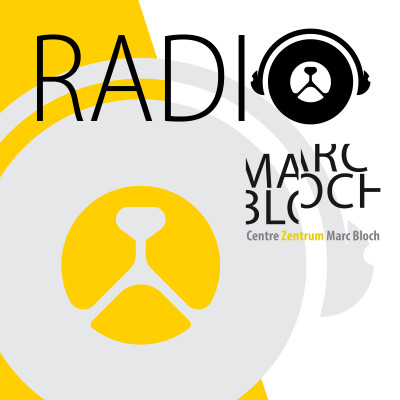Description
This new episode of Radio Marc Bloch reflects upon the conference "The power of laughter, laughing about power" which took place at the Centre Marc Bloch in Berlin the 15 and 16th of may 2025 and addressed the role of humor in politics. Alexandra Oeser, professor of Sociology at the University of Paris Nanterre and researcher at the Centre Marc Bloch debates with David Slucki, Director of the Australian Centre for Jewish Civilisation, and the Loti Smorgon Associate Professor of Contemporary Jewish Life and Culture at Monash University and Sebastian Jobs, assistant professor of North American history at the JFK Institute at the Freie Univeristät of Berlin.
The debate centers around the link between laughter, race relations, Jewishness and Blackness in the US in the 19th and 21st century. Laughter can be a weapon of the weak, but also as a pedagogical tool. Yet, how do we create meaning through laughter? The discussion evokes the importance of the audience for laughter, the way that identity politics and the social and historical background of protagonists play, but also how the lofe experience of the jokemaker can help us understand complex significations of humor inscribed in social and race relations. Moreover, laughter does not stop before violence, be it the holocaust or black slavery. The question then becomes that of agency or Eigensinn, of how maintaining humanity in face of violence and suffering.
For further information
Alexandra Oeser, André Gunthert and Eric Wittersheim, "The power of Laughter - Laughing about the powerful", International conference, May 2025, Centre Marc Bloch, Berlin
Alexandra Oeser, "Rire du passé nazi en Allemagne". Sociétés contemporaines, n°99-100, p. 105-126
Alexandra Oeser, « Le souvenir est-ce une affaire sérieuse ? », in Sarah Gensburger, Sandrine Lefranc, La mémoire collective en questions, Paris, PUF, 2023, p. 279-288.
Sebastian Jobs (ed.) Uncertain Knowledge (symposium). Rethinking History 18 (2014), No. 1.
Sebastian Jobs, “Alarming Plots": Spuren einer Sklavenverschwörung im amerikanischen Süden, 1802. Comparativ 28 (2018), No. 3, 73–89
Sebastian Jobs, Welcome Home Boys! Military Victory Parades in New York City 1899-1946. Frankfurt/Main: Campus, 2012 (also published with University of Chicago Press 2013)
David Slucki, Avinoam Patt and Gabriel N. Finder (eds), Laughter After: Humor and the Holocaust (Detroit: Wayne State University Press, 2020)
David Slucki, Esther Jilovsky and Jordy Silverstein (eds), In the Shadows of Memory: The Holocaust and the Third-generation (London: Vallentine Mitchell, 2016)
To watcb the video clips of the mentioned scenes of Seinfeld click here and for Curb your Enthousiasm click here
Hébergé par Ausha. Visitez ausha.co/politique-de-confidentialite pour plus d'informations.





![#56 [Rediff.] Balzac, auteur féministe? Dialogue avec l'essayiste Titiou Lecoq et le chercheur Andreas Mayer cover](https://image.ausha.co/OodTdeNqRQ8m1pNTJf4IvnFjGzZ5o65KbfXz06lr_400x400.jpeg)